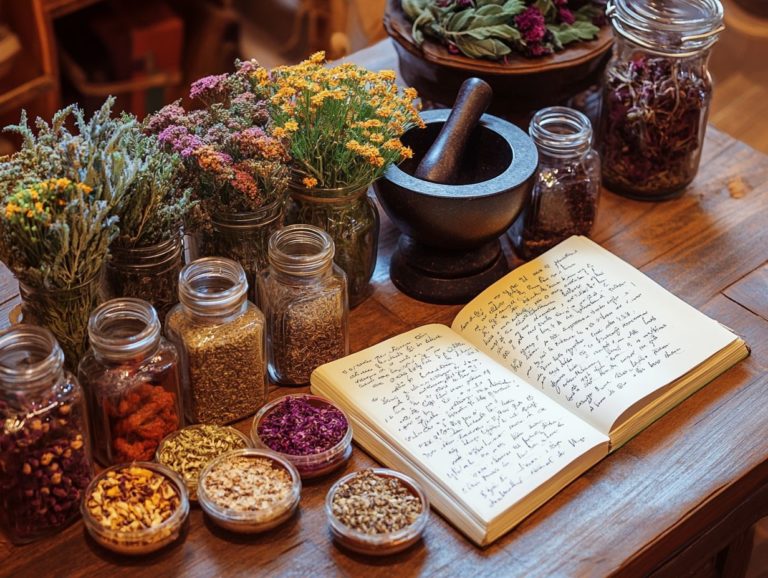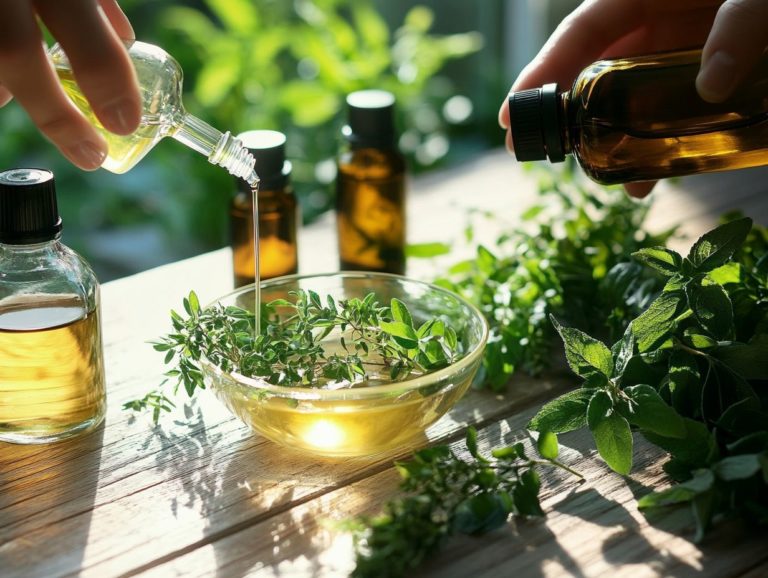10 DIY Herbal Remedies for Common Ailments
In a world increasingly gravitating towards natural solutions, you ll find that herbal remedies provide a gentle yet effective approach to addressing everyday health concerns, particularly through home remedies.
Imagine soothing a sore throat with a warm cup of ginger tea or alleviating menstrual cramps with the comforting spice of cinnamon. In this article, you ll explore ten DIY herbal remedies that you can easily create at home, utilizing both traditional medicine and modern techniques.
You will learn about their benefits, common herbs, dosage guidelines, and when to consult a healthcare professional.
Embrace the power of nature as you nurture your well-being!
Contents
- Key Takeaways:
- 1. Soothe a Sore Throat with Ginger Tea
- 2. Relieve Headaches with Peppermint Oil
- 3. Ease Nausea with Chamomile Tea
- 4. Treat a Cold with Echinacea
- 5. Soothe Your Anxieties with Lavender Oil
- 6. Improve Digestion with Fennel Seeds
- 7. Boost Immunity with Elderberry Syrup
- 8. Alleviate Menstrual Cramps with Cinnamon Tea
- 9. Reduce Inflammation with Turmeric
- 10. Fight Insomnia with Valerian Root Tea
- How to Make Your Own Herbal Remedies at Home
- Frequently Asked Questions
- 1. How do I make my own herbal remedies for common ailments?
- 2. What are some common ailments that can be treated with DIY herbal remedies?
- 3. Can herbal remedies really be effective for treating ailments?
- 4. Are there any potential risks or side effects to using DIY herbal remedies?
- 5. Can I use DIY herbal remedies for my children?
- 6. How do I know which herbs to use for which ailments?
Key Takeaways:

- Combat common ailments with natural DIY herbal remedies like ginger tea, peppermint oil, and chamomile tea.
- Good for you and improve digestion with elderberry syrup and fennel seeds.
- Before using herbal remedies, educate yourself on proper dosages, potential risks, and when to seek professional medical help.
1. Soothe a Sore Throat with Ginger Tea
Ginger tea is a classic remedy celebrated for its great health benefits. This delightful drink not only eases discomfort but it s also packed with goodness especially when you add the benefits of honey.
Packed with anti-inflammatory and antioxidant compounds, ginger works wonders by reducing throat inflammation and combating harmful pathogens. When paired with honey, you create a synergistic effect; honey coats your throat, providing additional moisture and sweetness that further eases irritation.
For a delightful preparation, simply steep freshly grated ginger in boiling water for about 10-15 minutes. Once it cools slightly, stir in a spoonful of raw honey. You can elevate your tea by adding a squeeze of lemon or a dash of cinnamon not only does this enhance the flavor, but it may also amplify its health benefits. Try it today!
2. Relieve Headaches with Peppermint Oil
Peppermint oil stands out as a powerful natural remedy, celebrated for its ability to alleviate headaches with its cooling and anti-inflammatory properties. This essential oil offers a refreshing method for headache management and serves as a time-honored alternative to traditional pain relievers.
When you apply peppermint oil to your temples or the back of your neck, you can stimulate circulation and experience a soothing sensation that helps melt away tension. Many people find that blending this oil with lavender or eucalyptus enhances its effectiveness, creating a synergy that promotes relaxation and further alleviates discomfort.
Incorporating peppermint oil into your holistic health regimen, alongside other natural therapies like stress-reducing practices or maintaining proper hydration, not only addresses immediate symptoms but also fosters long-term wellness. For those interested in enhancing their natural remedies, exploring herbal remedies in your kitchen can help you manage headaches better and feel good overall.
3. Ease Nausea with Chamomile Tea
Chamomile tea is a treasure celebrated for its calming effects and is recognized as an effective natural remedy for easing nausea. This soothing herbal tea quickly calms your stomach and helps you relax.
The active compounds in chamomile, like apigenin and bisabolol, are natural substances that help relax your stomach muscles. It s particularly beneficial when you re facing digestive distress. Adding ginger boosts its soothing effects, known for its powerful anti-nausea properties. A drizzle of honey not only sweetens your tea but also enhances its soothing qualities.
Historically, chamomile has been utilized since ancient times for various ailments, solidifying its status as a comforting beverage and a helpful partner. Beyond alleviating nausea, chamomile offers other health benefits, including reducing anxiety and promoting better sleep. It s an invaluable addition to your wellness routine try a cup tonight and feel the difference!
4. Treat a Cold with Echinacea
Echinacea is a revered herb in traditional medicine, known for its potential to combat the common cold. It enhances your immune system and effectively reduces symptoms, offering a natural path to relief.
This remarkable herb works by stimulating white blood cell activity and boosting a process that helps fight infections both essential for a robust immune response. Native American tribes harnessed Echinacea for various ailments long before its global acclaim. You ll find a variety of preparation methods available, such as teas, tinctures, and capsules.
Typical dosages land between 300 and 500 mg of standardized extract, taken two to three times daily. For optimal immune support, combine Echinacea with other natural remedies like elderberry, zinc, or vitamin C. This combination creates a synergistic effect that amplifies the overall effectiveness of your immune-boosting regimen.
5. Soothe Your Anxieties with Lavender Oil
Lavender oil is acclaimed for its calming properties and is a premier natural remedy for anxiety relief. This essential oil not only fills your space with a soothing aroma but also fosters relaxation, easing the stress of daily life.
Scientific studies reveal that lavender can significantly diminish anxiety levels. Research published in the Journal of Alternative and Complementary Medicine highlighted lavender’s effectiveness for individuals both before surgery and in everyday situations.
To maximize its benefits, consider various application methods. Aromatherapy involves diffusing lavender oil into the air for easy inhalation. Topical application can be done by diluting the oil with a carrier and applying it to your pulse points.
Stay mindful of potential contraindications, such as allergic reactions or interactions with specific medications. Consulting with a healthcare provider before use is a wise step for your safety and well-being.
6. Improve Digestion with Fennel Seeds

Fennel seeds are your go-to natural remedy, renowned for enhancing digestion and alleviating digestive issues. These aromatic seeds are a staple in traditional medicine practices worldwide and for good reason. They promote better digestion and tackle pesky issues like flatulence and stomach aches, boosting your overall digestive health.
The magic lies in their unique compounds, such as anethole and fenchone. These compounds have carminative properties, meaning they ease gas buildup and calm your gastrointestinal tract. Fennel seeds offer anti-inflammatory and antioxidant benefits, potentially reducing bloating and discomfort while improving nutrient absorption.
For the best results, try steeping one to two teaspoons of crushed fennel seeds in hot water to create a soothing tea. You can enhance this preparation by adding ginger or peppermint a holistic approach to your gastrointestinal wellness.
7. Boost Immunity with Elderberry Syrup
Elderberry syrup has earned its place as a revered natural remedy, particularly cherished for its ability to bolster the immune system during cold and flu seasons. Rooted in traditional medicine, this syrup is not just a health booster; it’s a delightful addition to your wellness routine, brimming with antioxidants and vitamins that enhance overall health.
If you’re eager to tap into the health benefits of elderberries, making your own homemade syrup is easy. Simply simmer the berries with water and natural sweeteners like honey, and you re on your way to a healthful treat.
Regular consumption typically recommended at 1-2 tablespoons per day for adults can significantly strengthen your immune responses. Elderberry stands out due to its potent antiviral properties, making it a top choice during virus outbreaks.
Compared to herbal supplements like echinacea or garlic, elderberry syrup offers a unique blend of flavor and effectiveness that appeals to both children and adults. Try making your own elderberry syrup today and boost your immunity!
8. Alleviate Menstrual Cramps with Cinnamon Tea
Cinnamon tea is a luxurious natural remedy that can work wonders in alleviating menstrual cramps. Its impressive anti-inflammatory properties and warm effects support women s health and provide relief during that time of the month, along with many other health benefits.
The anti-inflammatory compounds in cinnamon target the cramps and discomfort associated with menstruation, easing pain and promoting relaxation. To prepare your soothing cup, simply steep a cinnamon stick or a spoonful of ground cinnamon in hot water for several minutes.
For an extra layer of flavor and enhanced benefits, try adding:
- Add honey for a touch of natural sweetness.
- Include ginger, known for its anti-inflammatory properties.
These additions elevate the taste and intensify the soothing effects many women find invaluable during their monthly cycle. Enjoy this comforting brew and relish the relief it brings.
9. Reduce Inflammation with Turmeric
Turmeric is celebrated for its remarkable anti-inflammatory properties, making it an exceptional natural remedy for alleviating inflammation linked to various health conditions. This golden spice, rooted in traditional medicine, boasts potent medicinal qualities that combat inflammation and enhance overall health.
Incorporating turmeric into your meals can be both easy and flavorful. To maximize the absorption of curcumin a component known to benefit your body pair turmeric with black pepper, which contains piperine. Piperine enhances curcumin’s bioavailability, meaning how well your body can absorb it.
Imagine adding turmeric to your morning smoothies, drizzling it into soups, or sprinkling it over roasted vegetables. You might also try a golden milk recipe, blending turmeric with coconut milk and honey for a soothing drink, perfect for winding down at the end of the day.
10. Fight Insomnia with Valerian Root Tea
Valerian root tea stands out as a respected natural remedy for insomnia. It’s renowned for its sleep-inducing effects that foster restful sleep and relaxation.
With roots deeply embedded in traditional medicine, this herbal infusion offers a safer alternative to conventional sleep aids. It effectively calms the mind and prepares the body for a rejuvenating night’s rest.
The key to valerian root s effectiveness lies in its remarkable ability to boost gamma-aminobutyric acid (GABA) levels in the brain. This helps alleviate anxiety and promotes drowsiness. Unlike many conventional sleep medications, which often come with a daunting array of side effects, valerian root enjoys a generally favorable safety profile.
Many find that sipping valerian tea about 30 to 60 minutes before bedtime enhances its soothing effects. Don’t wait! You can start enjoying restful sleep tonight!
By weaving this herbal tea into your nighttime routine, you can not only drift off to sleep more swiftly but also embrace deeper, more restorative slumber.
How to Make Your Own Herbal Remedies at Home
Creating your own herbal remedies at home is not just a rewarding endeavor; it’s a way to tap into the incredible power of nature. By embracing the principles of traditional medicine and natural remedies, you can elevate your health and well-being.
As you delve into the benefits of various herbs and learn how to prepare them effectively, you’ll be able to tailor your wellness routine to suit your unique needs. Enjoy the therapeutic art of crafting DIY herbal remedies for common cold relief yourself.
To embark on this enriching journey, start by selecting high-quality ingredients. The potency of your remedies hinges on the herbs you choose, so researching their properties is essential. This knowledge will guide you in selecting the herbs that best address your specific health concerns.
You’ll find that the methods of preparation are diverse
- Infusions
- Tinctures
- Poultices
- Salves
Each method has its own unique advantages. Always prioritize safety; make it a habit to conduct a patch test for topical applications and consult a healthcare professional if you re on medication.
Simple remedies like chamomile tea for relaxation or a ginger infusion for digestive support are excellent starting points. For those new to herbal practices, exploring 5 essential herbal preparations for beginners can provide valuable insights. Consider keeping a journal of your experiences to track what works best for you. This will ensure you use these remedies effectively and responsibly, making the most of your herbal journey.
What Are the Benefits of Using Herbal Remedies?

Herbal remedies present a wealth of advantages, showcasing natural healing properties, minimal side effects, and the ability to support holistic health. This makes them a vital component of traditional medicine across various cultures.
By embracing these nature-based solutions, such as 5 DIY herbal remedies for seasonal allergies, you can effectively address a range of health concerns while simultaneously promoting your overall well-being.
Increasingly, individuals like yourself are gravitating toward these alternatives, often appreciating their lower costs compared to conventional pharmaceuticals. Take ginger, for example; it’s well-regarded for its ability to alleviate nausea. Then there’s chamomile, which not only helps you unwind for a good night’s sleep but also soothes digestive issues. Additionally, exploring 5 common herbs with healing properties can provide further options for natural remedies.
Herbal options like echinacea are routinely employed to strengthen the immune system, offering a gentler approach to warding off colds and infections. By weaving these remedies into your daily routine, including DIY herbal remedies for digestive health, you can enhance your vitality and reduce your reliance on synthetic medications.
What Are Some Common Herbs Used in DIY Remedies?
Several common herbs form the backbone of DIY remedies, each boasting unique properties tailored to various health needs and rooted in traditional medicine practices. Herbs like ginger, garlic, and turmeric can seamlessly become part of your homemade solutions for everyday ailments.
Beyond these, peppermint stands out for its soothing effects on digestion, while chamomile is treasured for its calming qualities, making it a reliable choice for stress relief.
Each of these herbs can be prepared in a variety of ways brewed as teas, infused in oils, or blended into tinctures. By integrating these simple yet powerful plants into your daily routine, you can tap into their natural healing capabilities.
For example, a warm cup of ginger tea can work wonders for nausea, while garlic-infused oil not only enhances flavor but also acts as a natural antibacterial agent. If you’re interested in creating your own remedies, consider crafting your own herbal remedies at home for added benefits.
How Can You Determine the Right Dosage for Herbal Remedies?
Determining the right dosage for herbal remedies is crucial for both effectiveness and safety. Each herb has unique properties and specific usage guidelines. Make sure to consider various factors, such as your individual health conditions, the form of the herb, and how it s prepared. These factors can significantly impact dosage recommendations.
Variables like your age, weight, and overall health status play an important part in customizing dosages. For example, a child will typically require a much lower dosage than an adult, given the differences in metabolism and body composition.
If you have pre-existing health conditions, you may need to adjust your intake based on your unique situation. It s advisable to start with lower amounts and gradually increase while carefully monitoring for any adverse effects.
When uncertainty arises, consulting with a healthcare professional protects you from potential interactions and provides tailored guidance. This ensures you achieve the best possible outcomes from your herbal treatments.
Are There Any Risks or Side Effects of Using Herbal Remedies?
While herbal remedies can offer a wealth of benefits, it’s crucial for you to consider the potential risks and side effects that may accompany their use. Each herb interacts uniquely with your body, so understanding these nuances will help you adopt a safe and effective approach to incorporating natural remedies into your wellness routine.
Many people tend to overlook how certain herbs can interfere with prescription medications. This can lead to unintended effects or reduced effectiveness. Take St. John’s Wort, for example; it s known to impact antidepressants and birth control pills. Garlic may alter the effectiveness of blood thinners.
Therefore, it’s essential for you to conduct thorough research on each remedy. Pay particular attention to its potential interactions with other treatments you may be using. Engaging with healthcare providers can offer personalized guidance, ensuring that any herbal approach you take aligns safely with your overall health management. You might also explore 5 delightful DIY herbal teas for wellness to enhance your health regimen.
When Should You Seek Professional Medical Help Instead of Using Herbal Remedies?
While herbal remedies can offer significant benefits, it’s crucial to recognize when seeking professional medical help is essential rather than relying solely on natural treatments. This is especially true for serious health concerns or when symptoms escalate. Understanding the limits of herbal remedies is vital for ensuring your optimal health and safety.
For example, if you find yourself grappling with severe pain, uncontrolled bleeding, or symptoms that might indicate a heart attack like chest pain or shortness of breath, your priority should be immediate medical attention rather than home remedies. However, for less urgent skin issues, you might consider learning how to create herbal skin treatments at home.
If you have chronic conditions such as diabetes or hypertension, it’s particularly important to remain vigilant. These illnesses often require ongoing management from healthcare professionals to prevent complications.
Embracing a balanced approach that blends herbal alternatives with conventional medicine can foster holistic healing. However, this should always be done under the guidance of qualified practitioners who can thoroughly assess your individual circumstances.
Using a neti pot can help relieve sinusitis.
Frequently Asked Questions
1. How do I make my own herbal remedies for common ailments?

To make your own herbal remedies, you will need to gather the necessary herbs and ingredients, such as jaggery powder and Indian gooseberry. Follow a recipe or guide, and properly prepare and store the remedies. It’s important to research the herbs and their potential interactions with medications or medical conditions before using them.
2. What are some common ailments that can be treated with DIY herbal remedies?
Many common ailments can be treated with herbal remedies. These include colds, coughs, headaches, digestive issues, stress, anxiety, and skin irritations.
3. Can herbal remedies really be effective for treating ailments?
Herbal remedies can be effective for treating ailments. Many herbs have healing qualities used for centuries.
4. Are there any potential risks or side effects to using DIY herbal remedies?
Herbal remedies are generally safe, but risks exist. Some herbs may interact with medications or cause side effects in people with specific conditions.
5. Can I use DIY herbal remedies for my children?
Always consult a pediatrician before using herbal remedies for children. Some herbs may not be safe or may require different dosages.
6. How do I know which herbs to use for which ailments?
Researching different herbs is crucial to understand their properties. Many resources, like books and online guides, can help you find the right herbs for specific ailments.






